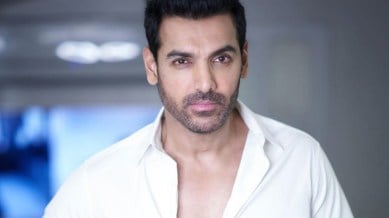📣 For more lifestyle news, click here to join our WhatsApp Channel and also follow us on Instagram
Marathi actor Sanjay Khapare recalls what John Abraham once told him about his eating habits: ‘No oil, masala food’
Sanjay Khapare, who shared screen space with John in the 2016-film Rocky Handsome, opened up John Abraham's dedication to fitness

John Abraham is known for his lean physique and dedication to staying fit and consuming clean foods. So, adding more to the list of foods Johan has quit — which includes kaju katli for over 25 years — Marathi actor Sanjay Khapare recently revealed that it’s been more than six years since the Force actor ate rice.
“His dedication is impeccable. There was this sequence where he hurt his hand. I was curious how he would workout following the injury. He said, ‘Now the control will be on diet‘. So, I asked him..doesn’t he eat rice? He said…yes yes, I did eat rice….six years ago…” said Khapare in an interaction with podcaster Aditya Gavhane.
monthly limit of free stories.
with an Express account.
Khapare, who shared screen space with John in the 2016 film Rocky Handsome, also added that the latter eats “no oil, no masala food”.
Taking a cue from Khapare’s candid confession, let’s understand what happens to the body when you quit rice for more than six years.
Dt Amreen Sheikh, chief dietitian, KIMS Hospitals, Thane, said that rice (especially white rice) is full of carbohydrates and digests quickly.
“Not eating rice can help eliminate the sudden blood sugar spikes from it. People who remove rice notice better weight maintenance, less variation in energy, and in some cases better digestion,” said Sheikh.
Sheikh said that when whole grains like millets, quinoa, and brown rice supplant rice in the diet, the body then has more nutrients and fibre to absorb, which helps with digestion and could potentially reduce the risks linked with lifestyle diseases such as diabetes. “Others have even indicated that not eating rice prohibits them from overeating, as rice is easy to eat in large quantities,” said Sheikh.
Is it safe for everybody to quit rice?
Not necessarily. “Rice is a staple and delivers quick energy. For some older people, more energy-demanding consumers, or people with specific medical conditions, to completely eliminate rice may not be possible. The issue is the total diet, if it is being replaced with whole balanced food, then it can be fine. If rice is removed without proper replacements, it can lead to tiredness or nutritional deficits,” said Sheikh.
What to note?
The trick is balance. If one decides to give up rice, that must be substituted by nutrient-rich foods that supply sufficient energy and fibre. “Grains, pulses, vegetables, and fruits can ensure that balance. It’s not a question of one food item being “good” or “bad,” but of the look of the entire plate on a daily basis,” said Sheikh.
Skipping rice for years might work for some, but it is not the rule for all. “The body loves variety, so the best thing to do is make food decisions that suit both health and lifestyle,” said Sheikh.
DISCLAIMER: This article is based on information from the public domain and/or the experts we spoke to. Always consult your health practitioner before starting any routine.
📣 For more lifestyle news, click here to join our WhatsApp Channel and also follow us on Instagram